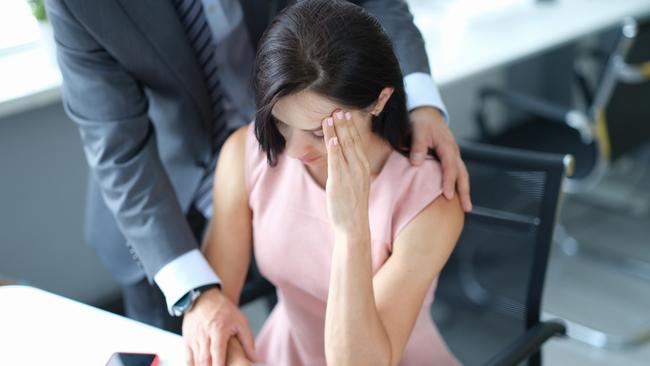Decline in sexual harassment, not sexual violence
Sexual harassment rates are falling, but Australian workplaces remain a problem, new ABS data reveals.

The penny might finally be starting to drop on sexual harassment, with a drop in prevalence rates in the last five years.
But around 1.3 million Australian women and more than 400,000 men were still subjected to sexual harassment in the last 12 months, Australian Bureau of Statistics data reveals.
While inappropriate comments about their body or sex life was the most widely reported type of sexual harassment reported by women, around 400,000 were subjected to unwanted touching or grabbing.
And new ABS data on sexual violence finds no similar decline in prevalence, with 1.9 per cent of women saying they experienced sexual violence in 2021, up from 1.2 per cent in 2012 and 1.8 per cent in 2016.
Overall 2.2 million women, more than one in five, experienced one or more incidents of sexual violence, defined as any incident involving the occurrence, attempt, or threat of sexual assault, since the age of 15.
Young women aged 18-24 were the most likely to report being subjected to both sexual violence and harassment, with 35 per cent saying they had been sexually harassed in the last year.
And women who identify as gay, lesbian, bisexual or queer reported were five times more likely to have experienced sexual violence than heterosexual women and more than three times more likely to have been subjected or sexual harassment.
The ABS report Sexual Harassment 2021-22 notes that a person has experienced sexual harassment if they are subjected to “behaviours which they found improper or unwanted, which made them feel uncomfortable, or were offensive due to their sexual nature.”
They include indecent texts or calls, unwanted touching or kissing, inappropriate comments about their body or sex life or exposure to sexual pictures or material they did not want to see.
It finds a significant decline in sexual harassment in Australia in the last five years.
“The 12-month prevalence rate of sexual harassment for women decreased from 17 per cent in 2016 to 13 per cent in 2021-22,” the report says. “This was driven by a decrease in the rate of sexual harassment by both a male (from 16 per cent to 12 per cent) and by a female (from 4.1 per cent to 1.1 per cent).
“For men, the 12-month prevalence rate of sexual harassment decreased from 9.3 per cent in 2016 to 4.5 per cent in 2021-22.
While face-to-face harassment decreased, online issues remained, the data finds.
“Between 2016 and 2021-22 the proportion of women who experienced sexual harassment in the last 12 months decreased across all the sexual harassment behaviours, except for having pictures or videos of themselves, which were sexual in nature, distributed or posted without their consent, where there was no statistically significant change.”
ABS head of crime and justice statistics Will Milne said receiving inappropriate comments about their body or sex life was the most widely reported behaviour, experienced by 800,000 women.
“Half a million women received an indecent text, email, or post, while 400,000 were subjected to unwanted touching or grabbing,” Mr Milne said.
Workplaces were still problematic, the data finds, with an estimated 330,000 women sexually harassed by someone who they had a work or professional relationship with, and 320,000 experienced it in person at their workplace.
Women were over three times more likely to have experienced sexual violence, which includes both sexual assaults and sexual threats, by a man they knew than by a male stranger.
“We found that an estimated two million women have experienced sexual violence by a man they knew, and around 600,000 by a male stranger,” Mr Milne said.
If you or anyone you know is in need or crisis, please call the National Sexual Assault, Domestic and Family Violence Counselling Service on 1800RESPECT (1800 737 732) or Lifeline (13 11 14).








To join the conversation, please log in. Don't have an account? Register
Join the conversation, you are commenting as Logout